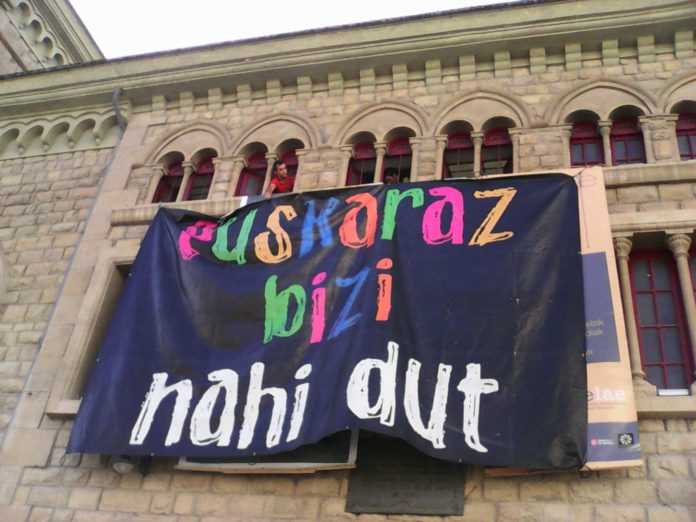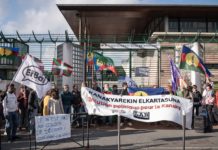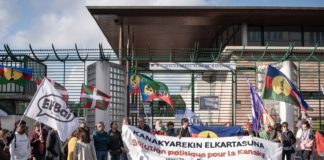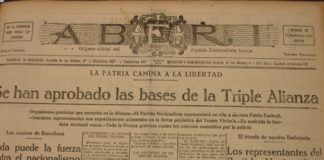Most of the groups and entities working for the Basque language agree that the language policies applied in the Basque Country under Spanish administration no longer work. Although the knowledge of the Basque language has increased somewhat in the Basque Autonomous Community and in Navarre, the use of the language is falling (the fall in its use in traditionally more Basque-speaking areas is very worrying). In the Basque Country under French administration, obviously, the situation is even worse. The linguistic laws of the Basque Autonomous Community and Navarre are 40 years old and, in addition to being not very ambitious, they are completely outdated, since the sociological context of the 21st century has little relation to that of the 20th century. The current linguistic model in the Western Basque Country, based on individual linguistic rights, does not guarantee, for example, that within 40 years the Basque language will be standardized, since it seems difficult for Basque to be hegemonic in certain fundamental areas: in the media communication, in the workplace, in new technologies, in higher education, in the environment of large cities, etc.
In order to alter the linguistic situation and give a boost to the Basque language, new proposals must be put forward. And when it comes to putting these proposals on the table, we must take into account what sociolinguistics teaches us. Thanks to this science we know that the language that has become that of a minority has not reached this situation by chance, but by military conquests, colonization, political and economic decisions, demographic policies, etc. Accordingly, it is time to demand reparation for the damage caused, to make decisions and provide the means so that this language reaches the level of its full normalization. And thanks to sociolinguistics we also know that in order to truly normalize a language it is essential to apply the principle of linguistic territoriality.
Likewise, sociolinguistics teaches us that a language that is not necessary is doomed to disappear. Therefore, if we want to guarantee the future of our language, it is essential to make the Basque language necessary, at least in the places where it is hegemonic. This leads us to formulate a new paradigm: in the most Basque-speaking areas, collective linguistic rights must be placed above individual rights, as is the case in Belgium, Switzerland or Finland….. or as is also done in Spain and France.
In some European states, as we will see later, the principle of linguistic territoriality has been working for a long time. Two situations can be distinguished in these states: that of the monolingual area, where the territory determines the only official language (that is, the collective rights of the population are placed above individual rights; this is the case of Flanders in Belgium, for example); and that of the bilingual zone, which guarantees individual linguistic rights (the personal rights of “linguistic liberalism” take precedence over collective rights). The current linguistic model in the Basque Autonomous Community or Western Basque Country is based on this last situation (it should be clarified that in the Basque Autonomous Community, in practice, the linguistic rights of Spanish-speakers are always and everywhere guaranteed, but the guarantee of the linguistic rights of Basque-speakers is very irregular)
The principle of linguistic territoriality, therefore, does not prioritize individual rights, but rather collective rights. It protects the rights of the linguistic community majority that lives in a territory. The aforementioned principle of territoriality has been very useful in normalizing the territorial languages of Switzerland, Belgium, Canada and Finland, and also to calm the linguistic disputes in those states. The policy based on individual linguistic rights, on the other hand, does not normalize a minority language, because as the expert Jean Laponce says: “Un erreur bien connue consiste à vouloir protéger une langue par des droits individuels transportables; au lieu de la protéger par des droits collectifs non transportables”. (ie, “A common mistake is to want to protect a language by applying transportable individual rights, instead of protecting it through non-transportable collective rights”).
We Basque-speakers need a qualitative leap to put aside our traditional role of resistance and begin to recover spaces for normal use. And the backbone of that linguistic change should be the application of the principle of linguistic territoriality, in our opinion.
This means that the Basque language must be given absolute priority in certain territories, making it necessary there. This is the only way to break the linguistic inertia favorable to Spanish (or French) which is currently dominant throughout the entire Basque Country.
The implementation of the principle of linguistic territoriality should be conducted through a change in the law. A new linguistic law for the Basque Autonomous Community (Western Basque Country) should establish two linguistic zones: the Basque-speaking zone and the bilingual zone. In the Basque-speaking area, the principle of linguistic territoriality (which protects collective rights) would be applied; while in the bilingual zone the current linguistic framework (which protects individual rights) would be maintained. To establish the extent of these two zones, the opinion of the experts will be taken into account, basing the separation of the linguistic zones on objective criteria, as was done in Belgium. Certain regions of the Western Basque Country, “a priori”, meet all the conditions for applying the principle of territoriality (the Lea-Artibai region in Bizkaia or the Urola-Kosta region in Gipuzkoa, among others).
There is no doubt that an overarching legal structure would facilitate the application of the principle of linguistic territoriality, and that should be the objective of all movements that work in favor of the Basque language: to put pressure on political representatives for this legal change. But we cannot stand still until that legal change occurs. From this very moment, steps must be taken so that the Basque language becomes a priority language in all areas in certain territories: the town councils of these areas must play a key role in this process.
RIGHTS AND OBLIGATIONS:
The new linguistic framework that will include the principle of territoriality must guarantee the same rights throughout the territory (the same linguistic rights in Ondarroa or in Vitoria-Gasteiz), despite applying different obligations. Thus, the inhabitants of the Basque-speaking area will have not only the right to use the Basque language, but also the obligation to know it. The Basque language will be the only official language there. The differences between the two linguistic zones: in one case, rights are recognized (in the bilingual zone), and in the other case, not only are rights recognized, but obligations are also imposed.
COPING WITH IMPOSITION:
The rigid imposition of French and Spanish makes the recovery of the Basque language impossible. In the 21st century, we still suffer a strong linguistic oppression. If we do not respond firmly and urgently, we may be in the last phase of the process of linguistic substitution that Spain and France started a long time ago.
It is urgent to activate and organize groups working in favor of the Basque language. To move political parties, trade unions and other groups in favor of our language, promote cooperation between institutions controlled by Basque nationalist parties …. before it is too late.
It is urgent to rebel against our subordination, to fight against the linguistic tyranny imposed on us, to expand disobedience in the linguistic field and to recover our collective pride.
These are not times for agreement. As in the political field, also in the linguistic field, bilateralism with Spain and France is impossible. We must travel the road on our own, uniting all the groups that work for the Basque language, in order to move forward with this proposal for linguistic territoriality.
APPENDIX: SOME MODELS IN EUROPE:
There are three states in which the principle of linguistic territoriality is applied in Europe: Belgium, which recognizes three monolingual linguistic communities (Flemish, French-speaking and German) and a bilingual capital; Finland, with two monolingual communities and some bilingual populations; and Switzerland, with four linguistic communities distributed in various cantons and without any bilingual area. In these three states, linguistic rights are not “transportable rights”, they do not correspond to individuals, but to communities.
The Irish themselves, who have been less than firm when it comes to defending their language, have given the area called “Gaeltacht” special treatment…… Isn’t it time to do something similar in Euskal Herria?








